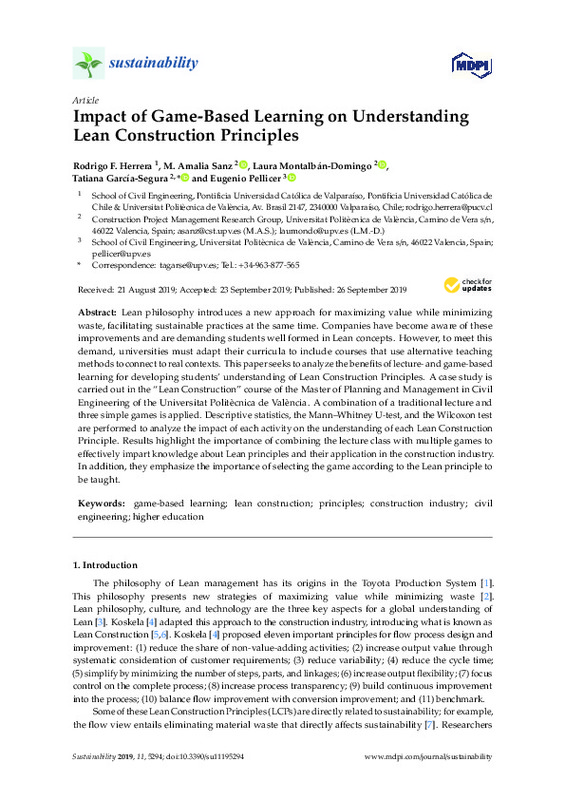Gao, S., & Low, S. P. (2013). The Toyota Way model: an alternative framework for lean construction. Total Quality Management & Business Excellence, 25(5-6), 664-682. doi:10.1080/14783363.2013.820022
González, V. A., Orozco, F., Senior, B., Ingle, J., Forcael, E., & Alarcón, L. F. (2015). LEBSCO: Lean-Based Simulation Game for Construction Management Classrooms. Journal of Professional Issues in Engineering Education and Practice, 141(4), 04015002. doi:10.1061/(asce)ei.1943-5541.0000243
Ballard, G., & Howell, G. (2003). Lean project management. Building Research & Information, 31(2), 119-133. doi:10.1080/09613210301997
[+]
Gao, S., & Low, S. P. (2013). The Toyota Way model: an alternative framework for lean construction. Total Quality Management & Business Excellence, 25(5-6), 664-682. doi:10.1080/14783363.2013.820022
González, V. A., Orozco, F., Senior, B., Ingle, J., Forcael, E., & Alarcón, L. F. (2015). LEBSCO: Lean-Based Simulation Game for Construction Management Classrooms. Journal of Professional Issues in Engineering Education and Practice, 141(4), 04015002. doi:10.1061/(asce)ei.1943-5541.0000243
Ballard, G., & Howell, G. (2003). Lean project management. Building Research & Information, 31(2), 119-133. doi:10.1080/09613210301997
De Carvalho, A., Granja, A., & da Silva, V. (2017). A Systematic Literature Review on Integrative Lean and Sustainability Synergies over a Building’s Lifecycle. Sustainability, 9(7), 1156. doi:10.3390/su9071156
Martínez León, H. C., & Calvo-Amodio, J. (2017). Towards lean for sustainability: Understanding the interrelationships between lean and sustainability from a systems thinking perspective. Journal of Cleaner Production, 142, 4384-4402. doi:10.1016/j.jclepro.2016.11.132
Florida, R. (1996). Lean and Green: The Move to Environmentally Conscious Manufacturing. California Management Review, 39(1), 80-105. doi:10.2307/41165877
Pellicer, E., Yepes, V., & Ortega, A. J. (2013). Method for Planning Graduate Programs in Construction Management. Journal of Professional Issues in Engineering Education and Practice, 139(1), 33-41. doi:10.1061/(asce)ei.1943-5541.0000120
Jeong, W., Chang, S., Son, J., & Yi, J.-S. (2016). BIM-Integrated Construction Operation Simulation for Just-In-Time Production Management. Sustainability, 8(11), 1106. doi:10.3390/su8111106
Ahmed, S. M., Yaris, C., Farooqui, R. U., & Saqib, M. (2014). Key Attributes and Skills for Curriculum Improvement for Undergraduate Construction Management Programs. International Journal of Construction Education and Research, 10(4), 240-254. doi:10.1080/15578771.2014.900833
Burch V, R. F., & Smith, B. (2017). Using simulation to teach lean methodologies and the benefits for Millennials. Total Quality Management & Business Excellence, 30(3-4), 320-334. doi:10.1080/14783363.2017.1303330
Becerik-Gerber, A.M.ASCE, B., Ku, K., & Jazizadeh, F. (2012). BIM-Enabled Virtual and Collaborative Construction Engineering and Management. Journal of Professional Issues in Engineering Education and Practice, 138(3), 234-245. doi:10.1061/(asce)ei.1943-5541.0000098
Clevenger, C., Glick, S., & del Puerto, C. L. (2012). Interoperable Learning Leveraging Building Information Modeling (BIM) in Construction Education. International Journal of Construction Education and Research, 8(2), 101-118. doi:10.1080/15578771.2011.647249
Kuriger, G. W., Wan, H., Mirehei, S. M., Tamma, S., & Chen, F. F. (2009). A Web-Based Lean Simulation Game for Office Operations: Training the Other Side of a Lean Enterprise. Simulation & Gaming, 41(4), 487-510. doi:10.1177/1046878109334945
Pivec, M. (2007). Editorial: Play and learn: potentials of game-based learning. British Journal of Educational Technology, 38(3), 387-393. doi:10.1111/j.1467-8535.2007.00722.x
De Freitas, S., & Oliver, M. (2006). How can exploratory learning with games and simulations within the curriculum be most effectively evaluated? Computers & Education, 46(3), 249-264. doi:10.1016/j.compedu.2005.11.007
Torres, M., & Macedo, J. (2000). Learning Sustainable Development with a New Simulation Game. Simulation & Gaming, 31(1), 119-126. doi:10.1177/104687810003100112
Qian, M., & Clark, K. R. (2016). Game-based Learning and 21st century skills: A review of recent research. Computers in Human Behavior, 63, 50-58. doi:10.1016/j.chb.2016.05.023
Plass, J. L., Homer, B. D., & Kinzer, C. K. (2015). Foundations of Game-Based Learning. Educational Psychologist, 50(4), 258-283. doi:10.1080/00461520.2015.1122533
Badurdeen, F., Marksberry, P., Hall, A., & Gregory, B. (2009). Teaching Lean Manufacturing With Simulations and Games: A Survey and Future Directions. Simulation & Gaming, 41(4), 465-486. doi:10.1177/1046878109334331
Deif, A. (2017). Insights on lean gamification for higher education. International Journal of Lean Six Sigma, 8(3), 359-376. doi:10.1108/ijlss-04-2016-0017
Brioso, X. (2015). Teaching Lean Construction: Pontifical Catholic University of Peru Training Course in Lean Project & Construction Management. Procedia Engineering, 123, 85-93. doi:10.1016/j.proeng.2015.10.062
Thomson, R., & McLeod, J. (2015). New frontiers in qualitative longitudinal research: an agenda for research. International Journal of Social Research Methodology, 18(3), 243-250. doi:10.1080/13645579.2015.1017900
Make a Card Simulationhttps://www.leanconstruction.org/learning/game-simulations/make-a-card-simulation/
Thomas, H. R. (1991). Labor Productivity and Work Sampling: The Bottom Line. Journal of Construction Engineering and Management, 117(3), 423-444. doi:10.1061/(asce)0733-9364(1991)117:3(423)
Gouett, M. C., Haas, C. T., Goodrum, P. M., & Caldas, C. H. (2011). Activity Analysis for Direct-Work Rate Improvement in Construction. Journal of Construction Engineering and Management, 137(12), 1117-1124. doi:10.1061/(asce)co.1943-7862.0000375
Dao, B., Kermanshachi, S., Shane, J., Anderson, S., & Hare, E. (2017). Exploring and Assessing Project Complexity. Journal of Construction Engineering and Management, 143(5), 04016126. doi:10.1061/(asce)co.1943-7862.0001275
Park, C. S., Le, Q. T., Pedro, A., & Lim, C. R. (2016). Interactive Building Anatomy Modeling for Experiential Building Construction Education. Journal of Professional Issues in Engineering Education and Practice, 142(3), 04015019. doi:10.1061/(asce)ei.1943-5541.0000268
Da Rocha, C. G., & Miron, L. I. G. (2018). The House Factory: A Simulation Game for Understanding Mass Customization in House Building. Journal of Professional Issues in Engineering Education and Practice, 144(1), 05017007. doi:10.1061/(asce)ei.1943-5541.0000347
Shaaruddin, J., & Mohamad, M. (2017). Identifying the Effectiveness of Active Learning Strategies and Benefits in Curriculum and Pedagogy Course for Undergraduate TESL Students. Creative Education, 08(14), 2312-2324. doi:10.4236/ce.2017.814158
[-]









